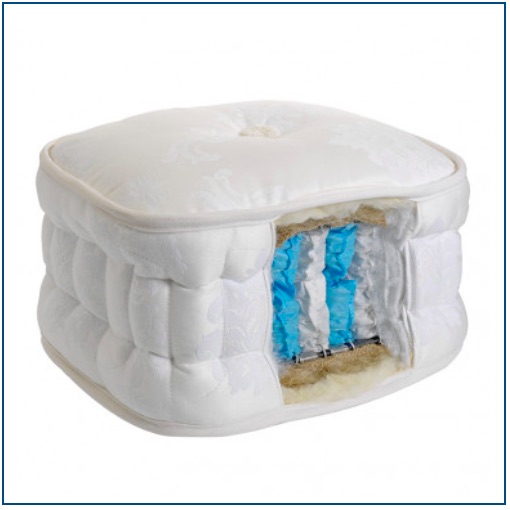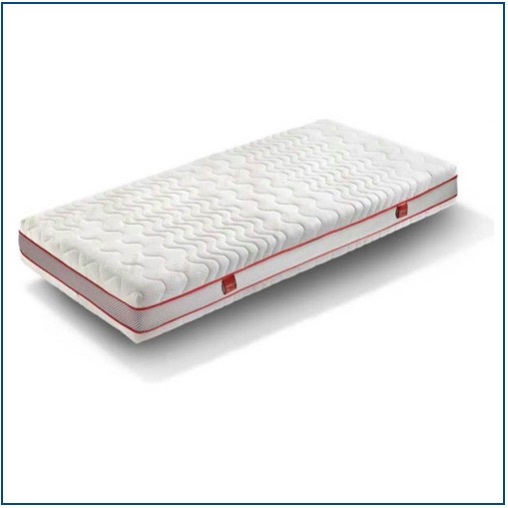Sleep is a crucial aspect of our lives that helps us recharge and rejuvenate for the next day. It plays a vital role in maintaining our overall health and well-being. Unfortunately, many people often overlook the importance of sleep and end up suffering from various sleep-related issues, including sleep deprivation, without realising they are deprived of sleep, and poor sleep quality, without realising what this implies.
One of the key factors that contribute to a good night’s sleep is having a high-quality mattress. A mattress provides comfort and support while we sleep, helping to reduce the risk of sleep-related problems such as back pain and insomnia. In this blog post, we will explore the benefits of sleeping on a high-quality mattress and how it can improve our sleep and health.
Reduce Pain and Discomfort with a good quality mattress
First and foremost, a good mattress helps reduce pain and discomfort. Sleeping on a mattress that provides proper support to our bodies helps prevent pressure points from forming, reducing the risk of back pain, neck pain, and other aches and pains. A high-quality mattress should be able to contour to the shape of your body, providing even support and reducing pressure on sensitive areas.
When choosing a mattress, it is important to consider several factors to ensure that it will provide the comfort and support you need for a good night’s sleep. Although we have spoken before about what to look for in a good mattress here are some important points to remember:
- Mattress type: There are several types of mattresses available, including pocket spring mattresses, memory foam mattresses, latex mattresses, and even waterbeds. Each type has its own unique properties, and it is important to consider your needs and preferences when selecting a type.
- Firmness: Mattress firmness is a personal preference, and some people prefer a firmer mattress while others prefer a softer one. It is important to choose a mattress that is comfortable for you, as a mattress that is too soft or too hard can cause discomfort and interrupt sleep.
- Support: A good mattress should provide proper support to your body, especially your back, neck, and hips. Consider the level of support you need based on your sleep position and body type.
- Durability: Investing in a high-quality mattress is an investment in your health and well-being, so it is important to choose a mattress that will last. Consider the materials used to construct the mattress, as well as the manufacturer’s warranty, when making your selection.
- Comfort: Comfort is a key factor in improving sleep quality. Consider the materials used in the mattress, such as the type of foam or padding, and try the mattress out in person if possible to ensure it is comfortable for you. Ensure that you are not allergic to any of the materials that the mattress (or other bedding) contain.
- Price: Mattresses can range in price from a few hundred euros to several thousand, so it is important to set a budget and consider the cost when making your selection.
The health and mental health benefits derived from a good mattress
Another benefit of a good mattress is reduced stress and anxiety. When we sleep, our bodies release hormones that help reduce stress and anxiety levels. However, if our sleep is interrupted, these hormones are not released, leading to increased stress and anxiety levels. A high-quality mattress can help reduce sleep disruptions, promoting the release of these hormones and reducing stress and anxiety levels.
Furthermore, a good mattress can improve overall health. Research has shown that poor sleep quality can have a significant impact on our physical and mental health. Poor sleep has been linked to several health problems, including obesity, heart disease, and depression.
Studies have found that individuals who suffer from sleep deprivation have a higher risk of developing obesity (1). This is due to the impact that sleep has on hormones that regulate hunger and fullness. When we don’t get enough sleep, our bodies release more of the hormone ghrelin, which stimulates appetite, and less of the hormone leptin, which signals fullness. This can lead to overeating and weight gain.
Heart disease is another health problem that has been linked to poor sleep quality (2). Studies have found that individuals who suffer from sleep disorders, such as sleep apnea, have a higher risk of developing heart disease. This is due to the impact that sleep disorders have on cardiovascular health, including increased blood pressure and heart rate.
Depression is another mental health problem that has been linked to poor sleep quality. Research has found that individuals who suffer from sleep deprivation have a higher risk of developing depression, as well as other mood disorders. This is due to the impact that sleep has on our brain function and mood regulation.
Sleeping on a comfortable and supportive mattress can help reduce the risk of these health problems and improve overall health (3). A good mattress can improve sleep quality by reducing disruptions and providing comfort and support. This can lead to improved hormone regulation, cardiovascular health, and brain function, resulting in a reduction in the risk of obesity, heart disease, and depression.
In conclusion, sleeping on a high-quality mattress is a key factor in improving sleep quality and overall health. A mattress that provides comfort and support can help reduce pain and discomfort, improve sleep quality, reduce stress and anxiety levels, and improve overall health.
When shopping for a mattress, be sure to consider your needs and preferences and invest in a mattress that will provide the support and comfort you need for a good night’s sleep.
References:
- Patel, S. R., Malhotra, A., White, D. P., Gottlieb, D. J., Hu, F. B., & Waters, W. F. (2006). Association between reduced sleep and weight gain in women. American Journal of Epidemiology, 164(10), 947-954.
- Punjabi, N. M. (2008). Sleep-disordered breathing and cardiovascular disease. Progress in Cardiovascular Diseases, 51(2), 121-131.
- Irwin, M. R., & Cole, J. C. (2011). Reciprocal regulation of the sleep-wake cycle and immune system. Nature Reviews Neuroscience, 12(5), 463-475.


















































